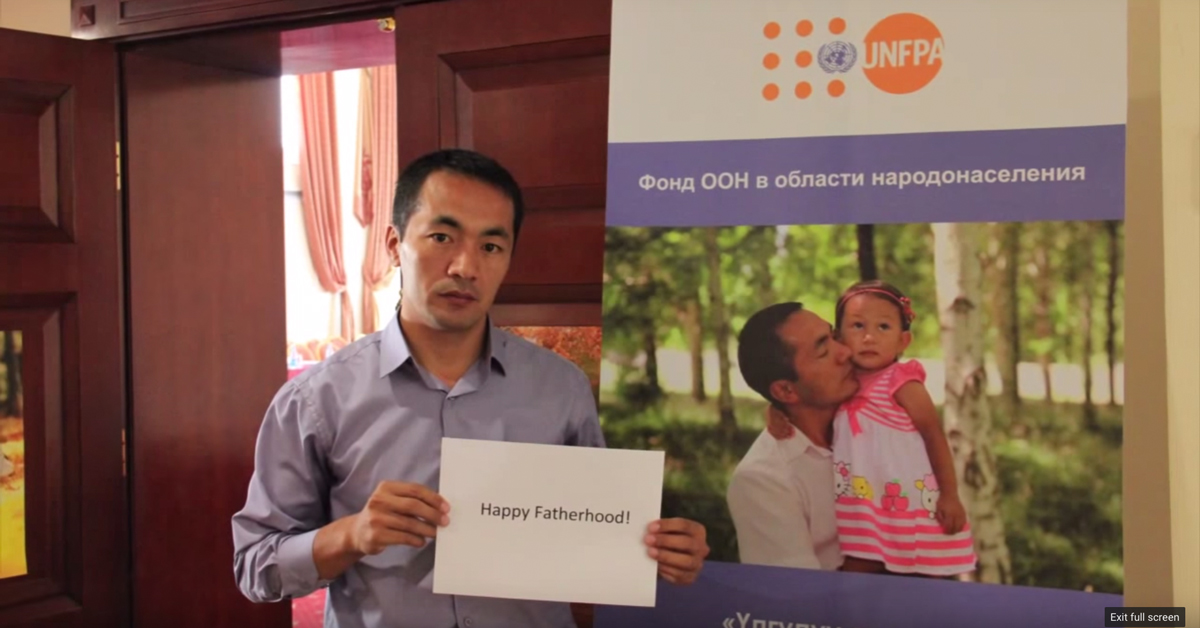
On June 23, the UNFPA country office in Kyrgyzstan launched a MenCare campaign in the country’s Chui province, kicking off the initiative with a roundtable meeting in the capital city of Bishkek. The meeting aimed to raise awareness among policymakers about the importance of better engaging fathers in caregiving.
This is a critical issue in the country, where national statistics find that men spend only 0.6% of their time caring for their children. UNFPA research in Kyrgyzstan also shows that 40% of surveyed high school students do not consider their fathers to be role models, while 43% of girls do not want their future husbands to be like their own fathers. UNFPA, with the participation of representatives from Kyrgyz Government, experts, and NGOs, organized the platform for discussion to look at results of the study and campaign results around fatherhood carried out in Kyrgyzstan’s Talas province in 2014.
The launch of UNFPA’s first fatherhood campaign in Kyrgyzstan, entitled “Happy Fatherhood,” took place in 2014 in the Talas province. The campaign produced a series of informational materials with positive messaging about involved fatherhood and caregiving. These materials focused on relationships between fathers and children, encouraging men and boys to actively promote gender-equitable relationships and parenting. The campaign used the materials in birth preparation schools, in classes for young parents, in extracurricular activities in colleges and vocational schools, and in work by youth activists around gender-based violence prevention.
In 2014, the “Happy Fatherhood” campaign in Talas also organized a series of events to raise awareness about men and boys’ role in advancing gender equality, promoting sexual and reproductive health and rights, and improving family wellbeing.
Events were held at:
1) The “Bakay Ata” birth preparation school:
Experts shared information about the importance of maternal and newborn care, as well as danger signs during pregnancy and how fathers should react. Future fathers were active during the session and asked questions about the role of gender in the family and the division of care work at home.
“I had not attended classes at the birth preparation school before. I thought that the classes were only for my wife and that men usually did not go to such classes. But today I learned a lot, and now I will recommend that my friends also attend classes with their wives. I learned that this information was essential for fathers as well,” one participant said.
2) The military base:
Fathers visited their sons at a military unit in the Talas province, breaking the Kyrgyz tradition that only mothers should visit their sons in the armed services. The event included sessions on men’s reproductive health, family planning, and nonviolent relationships. Members of the military discussed relevant themes, including communication within relationships, family structures, and harm caused by bride kidnaping.
3) Talas’ central football stadium:
Fathers and children participated in a football (soccer) tournament and received T-shirts with the campaign motto Atam jana Men (“My Dad and Me”). The aim of the tournament was to showcase ways in which fathers can be involved in play and other activities in positive, nonviolent ways.
“I think you should always start with yourself. Parents, moms, and dads should try to behave so that everything they do is a good example for their children,” one participant said.